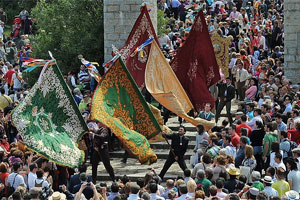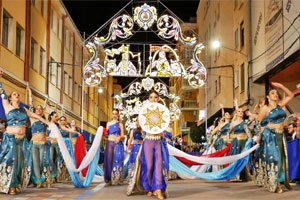The Fallas of Denia
What are the Fallas of Denia?
Las Fallas of Denia is a popular festival held in the city of Denia. It is a local version of the Fallas of Valencia and is celebrated from March 15 to 19 each year.
During the celebration of the Fallas of Denia, papier-mâché and wooden monuments are built and displayed in the streets of the city for several days. These monuments usually represent satirical and humorous scenes, and are burned in a large bonfire during the night of March 19, in what is known as the "cremà".
In addition to the construction and burning of the monuments, the Fallas of Denia also include a number of events and activities, such as parades of floats, paella contests, concerts, fireworks displays and much more. It is also common for religious events to be held, such as the offering of flowers to the Virgen de los Desamparados.
A traditional and popular festival that attracts thousands of visitors every year and has become one of the most important celebrations in the city.
How do they differ from the Fallas of Valencia?
Although the Fallas of Denia are a local version of the Fallas of Valencia, there are some differences between the two celebrations. Some of these differences are:
- Duration: While the Valencia Fallas are celebrated from March 15-19, the Denia Fallas usually start a few days earlier and last longer, often into the following weekend.
- Size: The Fallas of Valencia are known to be one of the largest festivals in Spain and attract millions of visitors each year. Denia's Fallas, on the other hand, are smaller and more local, although they are also very popular.
- Style of the monuments: Although the monuments of the Denia Fallas are also made of papier-mâché and wood and usually depict satirical and humorous scenes, they often have a style of their own, different from the monuments of Valencia.
- Popular traditions: Although the Fallas of Denia share many traditions with the Fallas of Valencia, such as the burning of the monuments and the parades of floats, they also have some unique traditions. For example, in Denia it is common for paella contests to be held during the Fallas.
Although Denia's Fallas have some differences from Valencia's, both celebrations share the same spirit of celebration, joy and tradition.
Tips for visitors
If you plan to visit the Fallas in Valencia or any other city in the Valencian Community, here are some useful tips:
- Book in advance: Las Fallas is one of the most popular festivals in Spain, so it is advisable to book accommodation and activities in advance to avoid running out of options.
- Be prepared for the crowds: Las Fallas attracts thousands of visitors each year, so it's important to be prepared for the crowds. Wear comfortable shoes and appropriate clothing for the weather, bring water and food with you, and be patient in crowded areas.
- Don't miss the main events: Las Fallas includes a wide variety of events and activities, from parades of floats and concerts to fireworks displays and the burning of the monuments. Make sure you don't miss the main events to enjoy the full experience.
- Enjoy local gastronomy: Las Fallas is also an opportunity to sample local cuisine, such as Valencian paella and pumpkin fritters. Take the opportunity to explore the gastronomic offer of the city and enjoy the local delicacies.
Origin and History
Las Fallas is a festival of very ancient origin that is celebrated in various regions of Spain, especially in the Valencian Community. Its origin dates back to the Middle Ages, although its current format was developed in the 19th century.
The history of the Fallas dates back to the 15th century, when the carpenters of Valencia began to burn the remains of wood left over from their work to celebrate the arrival of spring. Over time, this custom evolved into a popular festival that is celebrated throughout the Valencian Community.
The term "falla" comes from the Latin "fax", which means torch or lit firebrand.
In Denia, the first Fallas were celebrated in 1954, thanks to the initiative of a group of friends who decided to plant a falla in the city. Since then, the Fallas of Denia have been growing in popularity and importance, to become one of the most important festivals in the city.
In addition to the fallas, celebrations include parades of marching bands, offerings of flowers to the Virgen de los Desamparados, and the traditional "cremà" of the fallas, in which the figures are burned in a large bonfire. There are also paella contests, open-air dances and other festive events.
In short, the Fallas of Denia have their origin in the Valencian tradition of the feast of St. Joseph, and since its first edition in 1954, have been growing in popularity and importance, becoming one of the most important festivals of the city.
What to see in Denia, in addition to its Fallas
Besides the Fallas, Denia is a coastal town with many interesting things to see and do. Some of the most outstanding attractions in Denia are:
- Denia Castle: Denia Castle is a medieval fortress located high up, from where you can enjoy breathtaking views of the city and the Mediterranean Sea.
- Archaeological Museum of Denia: This museum offers a large collection of artifacts and historical objects dating from Roman and medieval times.
- Port of Denia: The port of Denia is one of the liveliest areas of the city, with many bars, restaurants and stores, as well as a beach nearby.
- Montgó Natural Park: This park is an ideal place for hiking and enjoying nature, with numerous hiking trails and breathtaking panoramic views.
- The fishermen's quarter of Baix la Mar: This picturesque neighborhood of narrow streets and white houses is one of the oldest in Denia and is ideal for strolling and discovering the culture and history of the city.
- Beaches of Denia: Denia has a wide variety of sandy and rocky beaches, with crystal clear waters and beautiful scenery, such as Playa de las Rotas or Playa de la Marineta Casiana.
Denia is a city full of history, culture and nature, which offers a variety of attractions in addition to the Fallas.
Crafts and recommended purchases
Crafts
Denia is a city rich in culture and traditions, and its handicrafts are a sample of this. Some of the most outstanding crafts in Denia are:
- Ceramics: Ceramics is a very popular craft in Denia, with a long tradition in the region. You can find cups, plates, vases and other ceramic objects decorated with traditional designs.
- Basketry: Basketry is another popular craft in Denia, with a long history in the region. Wicker baskets and baskets are very popular in the city.
- Embroidery: Embroidery is a very fine and detailed craft in Denia. You can find bed linen, handkerchiefs and other hand-embroidered garments with traditional designs.
- Bobbin lace: Bobbin lace is a very elaborate and detailed craft in Denia. You can find towels, tablecloths and other decorative objects made with bobbin lace.
What to buy in Denia?
Denia has a wide variety of stores and markets offering local and regional products. Some recommended purchases:
- Olive oil: The Denia region produces high quality olive oil, which you can find in specialized stores.
- Wine: The Denia region is known for its quality wines, and you can find a wide variety of local wines in wine stores and bodegas.
- Oranges: The Valencia region is famous for its oranges, and Denia is no exception. You can find fresh oranges and other products derived from oranges, such as jams and juices, in local stores and markets.
- Gastronomic products: Denia has a wide variety of local gastronomic products, such as red shrimp, arroz a banda, fideuá, among others.
In short, Denia is a city with a rich tradition in handicrafts and a wide variety of high quality local products, making it an ideal place to shop and take home a souvenir of the city.
Typical popular gastronomy
Denia's gastronomy is a mixture of Mediterranean and Valencian flavors, with influences from the nearby region of Murcia. Some of its typical dishes:
- Red shrimp: Red shrimp is one of the star ingredients of Denia's gastronomy, and is used in numerous dishes, such as arroz a banda and fideuá.
- Arroz a banda: Arroz a banda is a traditional Valencian dish consisting of rice cooked in fish broth, accompanied by seafood and fresh fish.
- Fideuá: Fideuá is similar to arroz a banda, but noodles are used instead of rice. It is a very popular dish in the Denia region, and is prepared with fresh seafood and fish.
- Espencat: Espencat is a typical Denia salad prepared with roasted peppers, eggplant and crumbled cod.
- Paella: Paella is another typical dish of the region, and in Denia it is prepared with seafood and fresh vegetables.
- Cocas: Cocas are a kind of savory cakes made with bread dough and topped with ingredients such as tomato, onion, bell pepper and tuna.
- Nougat: Nougat is a typical sweet of the region of Valencia, and in Denia it is made in an artisanal way with almonds and honey.
Its cuisine is rich in traditional dishes and Mediterranean flavors, characterized by the use of fresh and high quality ingredients. If you visit Denia, you can not miss some of its typical dishes and enjoy its rich gastronomy.





